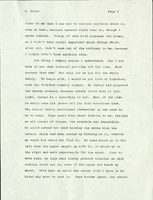Search the Special Collections and Archives Portal
Search Results

Ashok Mirchandani oral history interview: transcript
Date
Archival Collection
Description
Oral history interview with Ashok Mirchandani conducted by Kristel Peralta, Cecilia Winchell, and Stefani Evans on March 11, 2021 for the Reflections: The Las Vegas Asian American and Pacific Islander Oral History Project. In this interview, Mirchandani discusses his early life in Kolkata, West Bengal, India and arriving to Las Vegas, Nevada in 2002. He talks about Indian traditions he celebrates and Indian festivals in the United States. Mirchandani recalls his employment with the State of Nevada, becoming the Director of the Department of Business and Industry, and advocating for small businesses. Later, Mirchandani describes the importance of minorities in politics, engaging in policy making, and the need for Asian Americans in public services. Lastly, Mirchandani discusses the model minority myth, developing the Nevada Home Retention Program, and emphasizes children's mental health.
Text

Chapter from autobiography by Bella Stern, 1980
Date
Archival Collection
Description
In this chapter, Stern describes her upbringing in Russia and fleeing to Poland. It is accompanied by a letter to the publishing company William Morrow.
Text

Interview with Marcell Eugene Bridges, June 12, 2004
Date
Archival Collection
Description
Text

Interview with Zenna Mae (Schmid) Bridges, June 12, 2004
Date
Archival Collection
Description
Text

Interview with Helen Marguerite (Troester) Draper, June 24, 2004
Date
Archival Collection
Description
Text

Interview with Lilias Gordon, May 14, 2004
Date
Archival Collection
Description
Text

Transcript of interview with Rachel Gibson by Kay Long & Caryll Batt Dziedziak, August 25, 1998
Date
Archival Collection
Description
Rachel Gibson was the granddaughter of Nevada pioneers. Her maternal grandparents, George Rammelkamp and Anna Dougherty, were among the earliest white residents of northern Nevada, settling first in Dayton and later Yerington. Her mother, Clara Angelina, and her two aunts, Elizabeth and Georgie, graduated from the University of Nevada at the turn of the century. Clara taught in Yerington for a number of years before marrying Chase Masterson, a dentist. Rachel was born in 1913 in Yerington. The eldest of three children, she continued the tradition of women’s learning and education that began with her mother’s generation. Her 1930 class was the first to graduate from Las Vegas High School, and soon after Rachel moved to California to attend college. Although her father had counseled her to study law, Rachel chose the field of economics. She received her Bachelor’s degree from the University of California at Berkeley, and worked in San Francisco for one year before returning to complete
Text

Transcript of interview with Patricia Ross by Judy Harrell, March 19, 2014
Date
Archival Collection
Description
Patty Ann Drew’s life experiences capture large movements in Las Vegas history: mob-dominated gambling, the Helldorado Rodeo, explosive growth, medical advances, and Clark County School District’s Sixth Grade Centers—all in a desert city centered in the Mormon Culture Region. Patty arrived in Las Vegas as an infant with her parents and older brothers in 1944 and was raised in the Huntridge area, where she and her brothers attended John S. Park Elementary School and matriculated from there to Las Vegas High School. In this interview, Patty talks about her parents working on the Strip, her school days, joining the Church of Jesus Christ of Latter-day Saints, marrying her high school sweetheart, and becoming a young mother in Las Vegas. After Patty married her second husband, Thomas Ross, the couple built a house west of Jones Boulevard and Patty gave birth to her third son. In addition, she returned to school to earn her Bachelor’s and Master’s degrees and taught at C. H. Decker Elementary School for twenty years.
Text

Craig Galati Interview, October 24, 2016: transcript
Date
Archival Collection
Description
always thought I'd be more urban. I would live in a downtown city. I wouldn't have a car. I would walk around. I would work on these big skyscrapers.” At one point in his life, architect Craig Galati dreamt of designing large buildings in some of the nation’s biggest cities. Instead, he was drawn back to his childhood home of Las Vegas, where he created projects meant to preserve the city’s integrity, such as the Grant Sawyer State Office Building and the first building at the College of Southern Nevada Charleston Campus. He speaks to his work in preservation at the Las Vegas Springs Preserve and in welcoming visitors to Mount Charleston with his Spring Mountains Visitor Gateway design. In this interview, Galati talks about his parents’ decision to move from Ohio to Nevada and what it was like growing up in Las Vegas. He recalls his first teenage jobs in the Las Vegas of his youth and his studies in architecture at the University of Idaho. He recounts the dilemma of struggling to find architecture work he enjoyed and how that vision drew him back to Vegas. He describes various projects in his portfolio from his early years to the present. He speaks highly of his partnership with Ray Lucchesi and the basis for their vision: “We wanted to be a place that everybody liked to work for. Buildings were just tools to do something grander. They weren't an object. We had a philosophy that was not object based, it was people based.”
Text

Leonard M. Jessup interview, August 6, 2018: transcript
Date
Description
“I decided to just keep going, and I devoted my career to higher ed. I wanted to continue putting back into this system that I felt I got a lot out of. Again, repaying a debt.” What began as a passion for playing school sports would later lead Dr. Len Jessup on a path to lifelong service in the area of higher education. From his California childhood he would soon find himself across different U.S. states performing various higher education duties from professor to university president. In this interview, Jessup talks about his grandparents’ decision to emigrate from Italy to the U.S. and how grateful he feels towards his family as a result. He recalls playing baseball in college. In his eyes, being part of several sports teams helped him develop into the person he is now. He describes doing research during at the University of Arizona and speaks to what it was like moving from one university position to the next. Ultimately, his colleagues would recommend that he move to Las Vegas to
Text
